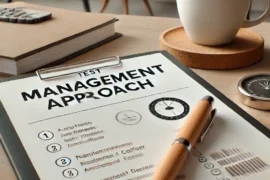Waste Management Quiz
Mastering Waste Management: Key Concepts and Applications
Introduction
Effective management is the cornerstone of any successful organization. Whether you are leading a small team or managing a large corporation, understanding key management principles is crucial. This article explores essential waste management concepts through detailed explanations and practical examples to help you deepen your knowledge and apply these principles effectively.
The Functions of Waste Management
Waste management involves the collection, transportation, processing, recycling, and disposal of waste materials. Each function plays a critical role in minimizing the adverse effects of waste on human health and the environment.
Collection: The First Step in Waste Management
Importance of Efficient Collection
Efficient waste collection is crucial for ensuring that waste materials are properly managed from the point of generation to disposal.
Examples of Waste Collection
For instance, municipal waste collection services pick up household garbage, recyclables, and yard waste from homes and transport them to appropriate facilities for processing.
Transportation: Moving Waste Safely
The Role of Transportation in Waste Management
Transportation involves moving waste from the point of collection to processing or disposal sites. Safe and efficient transportation is vital to prevent spillage and environmental contamination.
Real-World Application of Waste Transportation
For example, specialized trucks with secure containers transport hazardous waste to treatment facilities to ensure that harmful substances do not leak into the environment.
Processing: Converting Waste into Useful Products
Processing Methods
Processing waste involves converting waste materials into useful products or energy. This can include recycling, composting, and waste-to-energy technologies.
Examples of Waste Processing
For instance, recycling facilities sort and process paper, plastic, and metal into raw materials that can be used to manufacture new products. Composting converts organic waste into nutrient-rich soil amendments.
Recycling: Turning Waste into Resources
Importance of Recycling
Recycling reduces the consumption of raw materials, minimizes waste, and reduces environmental impact by converting waste materials into new products.
Examples of Recycling
For example, recycling aluminum cans saves energy and resources compared to producing new aluminum from bauxite ore. Recycled paper reduces the need for virgin wood pulp, conserving forests.
Disposal: Safely Managing Residual Waste
The Final Step in Waste Management
Disposal involves safely managing residual waste that cannot be processed or recycled. This often includes landfilling and incineration.
Examples of Waste Disposal
For instance, sanitary landfills are designed with liners and leachate collection systems to prevent groundwater contamination. Incineration reduces the volume of waste and can generate energy.
Strategic Tools in Waste Management
Implementing the 3Rs: Reduce, Reuse, Recycle
Understanding the 3Rs
The 3Rs (Reduce, Reuse, Recycle) are key principles in waste management that aim to minimize waste generation and promote sustainability.
Application of the 3Rs
For example, reducing waste involves choosing products with minimal packaging. Reusing materials includes using refillable water bottles instead of disposable ones. Recycling converts waste into new products, such as turning old newspapers into recycled paper.
Developing a Waste Management Strategy: Aligning Efforts with Goals
Creating an Effective Strategy
A waste management strategy aligns waste management efforts with organizational and environmental goals to ensure effective waste reduction and sustainability.
Examples of Waste Management Strategies
For instance, a company might develop a waste management strategy to achieve zero waste by implementing recycling programs, reducing packaging, and promoting product reuse.
Real-World Application of Waste Management Principles
Practical Waste Management Scenarios
Waste Management in Healthcare
To understand how these waste management principles work in real-world scenarios, consider a healthcare organization. The organization begins by collecting medical waste in secure containers. Transportation follows, with specialized vehicles moving the waste to processing facilities. Processing includes sterilizing and safely disposing of hazardous materials. Recycling programs might be implemented for non-hazardous waste, and any remaining waste is disposed of in compliance with regulations.
Conclusion
Mastering waste management requires a deep understanding of its core functions and the ability to apply strategic tools effectively. By focusing on the collection, transportation, processing, recycling, and disposal of waste, organizations can minimize their environmental impact and promote sustainability. Continuous learning and practical application of these concepts will enhance your waste management skills and contribute to the overall success of your organization.
By combining the theoretical knowledge from this article with practical exercises like the waste management quiz, you can solidify your understanding and become a more effective waste manager.








Comments are closed.